London's thieves are burying phones in flowerbeds
The police don't take much interest in returning the stolen devices to victims when they're dug up — so London Centric decided to do it instead.
When Dick Whittington first came to London, the saying goes that he expected to find the streets paved with gold. Nowadays he’d find the flowerbeds filled with stolen mobile phones.
When a reader first mentioned they’d heard about thieves burying devices in the earth of central London, I knew we had to investigate.
I thought we might uncover a new tactic used by the city’s mobile phone thieves. What I didn’t expect was that we would also be able to reunite one of the buried devices with its owner — resulting in an unexpected twist.
Scroll down to read that story — and go to the very end to read about a competition for paying subscribers.
Quick updates:
Our weekend read on the City of London’s treatment of its public spaces elicited a strong response from the best comments section on the internet. Many of readers were strongly supportive of the cafes who are facing eviction. In the name of balance, we have to report the email from a reader who said they’d like a Benugo to replace the independent operators and blamed “sentimental rich fools” for scaring away the chain.
London’s snails farms are suddenly everywhere after our story earlier this month. The BBC did a whole day of coverage about the sites we highlighted, featuring London Centric in its radio and TV broadcasts. We hope to have more tax-avoiding gastropod news for you soon.
For the last few weeks we’ve been looking into the new “selective licensing” regimes for private landlords in several London boroughs, after hearing various horror stories. What we didn’t expect is for chancellor Rachel Reeves to provide the perfect example of a London landlord who doesn’t understand the rules. If you’ve also encountered issues with the new requirements, do get in touch with your story.
We go digging for stolen mobile phones
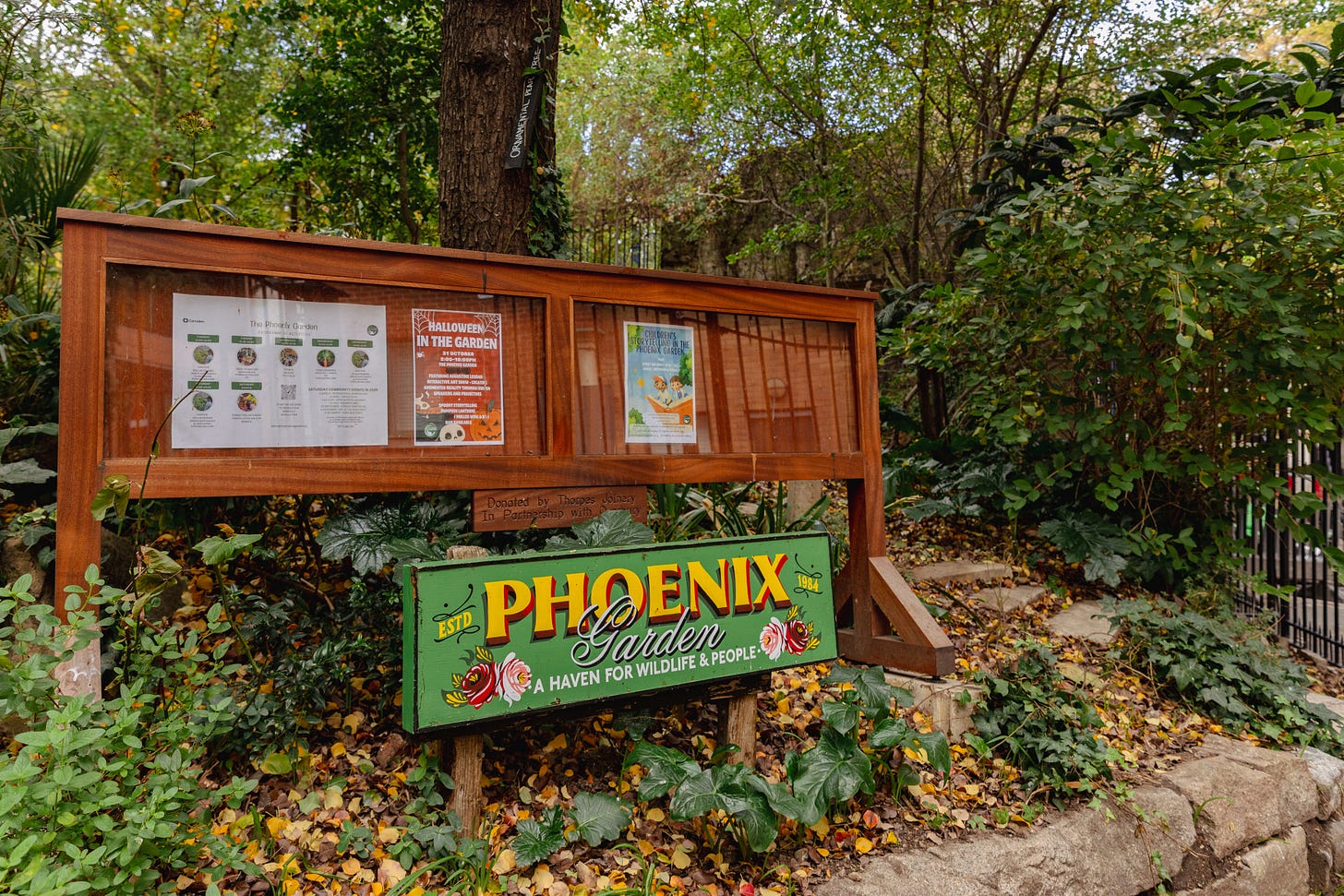
By Riya Sharma and Polly Smythe
At 8.45pm on 3rd October, a phone thief bumped up against a woman walking down Shaftesbury Avenue. It was a rainy Friday evening and the streets were busy with tourists and Londoners buzzing about Soho. Discreetly swiping the phone inside the victim’s jacket pocket, the thief made off with both her device and the thousands of irreplaceable photos and messages it held. It’s an experience familiar to many who live in the capital or have spent a holiday here.
What happened next will be far less familiar. The thief took the phone around the corner to the Phoenix Garden, a small community-run patch of green behind Shaftesbury Avenue in the middle of central London. It’s a special space where volunteers maintain an urban oasis on a former bomb site for locals and tourists to take a breather. To the despair of the volunteers, Phoenix Garden is doubling up as a storage facility for central London’s stolen phones – and they can’t get the Metropolitan police to take it seriously.
Once at the park, the thief buried the device an inch down in the dirt, alongside many others. Other criminals are less fastidious, with some phone thieves on e-bikes pulling up by the railings and chucking the phones over the fence into the shrubbery.
The following day, the thieves — or their accomplices — return to pick up their bounty. They are often found scrabbling in the dirt to recover stolen devices that can be shipped abroad to markets in Algeria or China.
Sometimes the thieves are beaten to their buried treasure by their victims. Last year, the garden’s staff said, a Canadian tourist whose phone had been stolen followed his Find My iPhone app to Phoenix Garden and spent a day of his holiday digging through its flowerbeds. By the end, he had unearthed his phone – and three others.
On other occasions the thieves simply fail to return, meaning the volunteers find abandoned devices as they tend to the plants. Some of them are wrapped in tinfoil to block GPS trackers such as Apple’s Find My.
Garden manager Louise Gates started keeping a log of finds in January 2024, although this only includes the devices discovered just beneath the surface. By May of this year, she’d recorded 23 abandoned phones that hadn’t been recovered by the thieves. Then she stopped counting. “The novelty wore off,” she said.
When Gates can’t track down a phone’s owner herself, she tries to give it to the police. Sometimes she walks into the local police station and finds no one there, so just tosses the stolen devices across the counter.
“They don’t really care,” she said.
The Met Police didn’t respond to our multiple requests for comment about why they don’t try to reunite the Phoenix Garden phones with their owners. So London Centric decided to do it for them.
“The police haven’t really paid a lot of attention to it as an issue”
This method of burying phones in a convenient central London location appears to have come about as a response to the growth of tracking apps on phones, according to David Rogers, a mobile phone security specialist who used to lead on fraud and security for the mobile operators trade body, GSMA.
He said it was similar to how thieves handle expensive vehicles that might have a tracker fitted to them: “Car thieves will typically drive them to a remote location and leave them for a day or so and see if anybody comes to pick them up, because they don’t know if there is a tracker in the car. They don’t want to lead the police or the owner to their secret hideout. What they’re trying to do is establish if the car is clean.”
“That’s similar to phones. You don’t necessarily know as a phone thief if Find My is turned on or not. It’s a risk for the thief that they get tracked down by the police.”
If you’re a thief spending a Friday night in central London stealing phones, you don’t want to have a lot of devices on you if you’re caught, especially in the initial period after a theft when crimes are most easy to be solved: “Being able to dispose of it quickly in the ‘golden hour’ for the police means that you’re not carrying anything if the police stop you.”
“The police haven’t really paid a lot of attention to it as an issue,” he said, criticising the Met’s sudden PR push on phone theft, which saw a flurry of stories about a raid on a criminal gang shipping devices abroad. “It’s almost like stunt policing. It should be business as usual. This is a major issue for many people in London. They need to take it seriously.”
“Your stolen phone”
When London Centric visited Phoenix Garden earlier this month, the volunteers had recently found a black Samsung Galaxy thrown in the bushes. With no identifying features available, they’d given up hope of returning it to their owner.
With their permission, London Centric charged up the phone and tried to trace the owner. The phone was locked, with no emergency contacts. Using some old sewing needles, we popped open the SIM tray to find a Vodafone card. We put the SIM into a garden employee’s phone and realized it had been deactivated. We tried ringing Vodafone to connect the found device with their customer but they were unable to help. Online advice suggested that our search was effectively doomed.
Yet when we took the Samsung apart we noticed that it had a removable memory card. By searching the files it contained we found a series of photographs, including a picture of a travel booking featuring an email address. After about an hour’s work, London Centric was able to send a message to the person whose phone had been found in a flowerbed.
Subject line: “Your stolen phone”.
There was only one problem: The person didn’t reply.
We chased again, and a response came back: Yes, that’s their phone. Yes, they’d like it back. And they had been slow to reply because they had been confused by the subject line of the email.
Somewhat improbably, the person whose stolen phone had randomly come into our possession was a London Centric reader. She had been busy and thought the email subject line from us was “just a particularly pertinent article”.
Which is how we ended up meeting Catherine Butler.
“I just was blaming myself”
Butler was heading out for Lebanese food with her parents when her phone was taken at the start of the month. She held the hood of her raincoat over her head as her family waited to cross High Holborn Street towards the Shaftesbury Theatre and her coat pocket suddenly felt lighter. When she confirmed her phone was no longer in her pocket, her mother commented that an older man had bumped into her at the crossing.
Butler said she immediately gave up hope of finding her phone, assuming it was most likely already on its way to another country.
“I just was blaming myself for it,” she told London Centric when we met her on Monday in Phoenix Garden. A teacher, she’s walked around central London for over twenty years and never had her phone stolen.
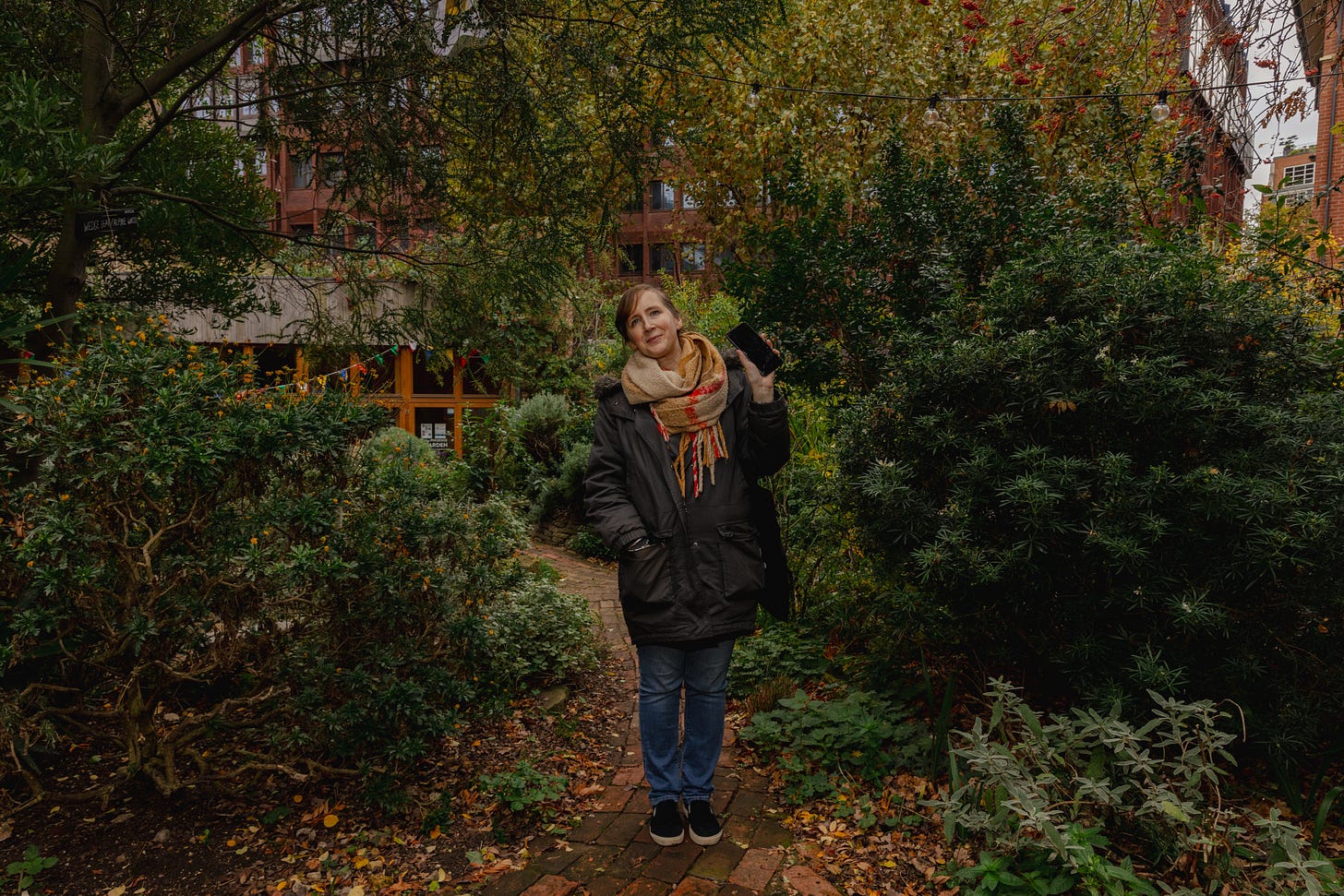
After the theft, Butler deactivated her SIM card and went to a Vodafone shop for a replacement. She had no backup for the thousands of photos, notes, reading lists and WhatsApp chat history stored in her old device. A employee at Vodafone told Butler that people constantly come in asking for replacement SIMs for their stolen phones.
When a friend asked why she didn’t file a complaint with the Met Police, Butler said: “It just didn’t occur to me.”
Her failure to report it isn’t unusual and casts doubt on the police’s figure of 80,000 stolen phones in London last year.
“It just makes me feel weird, like coming back to this area,” Butler added, reflecting on how common phone theft has become in central London. “I don’t feel the same as I used to before.”
While waiting for London Centric she had spotted someone cycling around the perimeter of the garden, reaching through the fence and looking for something in the bushes.
While she’ll likely keep her new phone now that she’s transferred all her data, recovering the old one means she can finally back up the photos and notes she was missing before giving it to someone else to use.
“Somewhere like this, it’s such a nice little oasis. But that also makes it a bit of a target for people at night, to feel like they can come here and not be spotted,” she said. “It just makes you think how organised these sorts of setups are.”
“They’re not even willing to do it.”
For Gates and the Phoenix Garden staff, the morning phone sweeps have become something of a ritual. The garden is already under pressure from the nearby Odeon cinema’s redevelopment into a Cirque du Soleil hotel and circus venue. Now, it is also stuck dealing with piles of stolen phones and a police force that’s reluctant to get involved.
Last year, Gates found somebody digging in one of the volunteers’ wheelbarrows. She interrupted him and asked what he was doing. He told her that somebody had buried something of his in there, but Gates thought that wasn’t the true story. He quickly ran away and when she looked through it herself, there was nothing. She thinks he was one of the guys there to bury a phone.
The garden has no security guards and limited CCTV. Gates, the garden’s only full-time employee, said staff can’t view the footage themselves and that the poor camera quality wouldn’t be of much use anyway. Over the week our reporter spent staking out the garden, we only saw police officers twice — both times dealing with people exposing themselves.
For Butler, the woman whose phone was returned by London Centric, the police weren’t worth speaking to when it came to finding her stolen phone.
She summed up the Met police’s attitude to phone theft as “Well, what can we do?”
When it comes to reuniting the victims of phone theft with their property, she added: “They’re not even willing to do it”.
Want to get in touch with London Centric? Click here to send an email or a WhatsApp for our journalists to investigate.
It’s reader competition time.
Inspired by today’s article we’ve commissioned the London Centric ‘TROWEL OF TRUTH’. This garden implement serves as both a tribute to the power of investigative journalism and also a handy mobile phone recovery service for when your device is next stolen on Oxford Street.
Made out of the finest, er, metal and wood, it features the London Centric logo and the motto “Never Stop Digging”.
We’re giving away ten of these trowels to paying subscribers — all you have to do to enter the prize draw is ensure you’re a paying member before midnight on Friday. This way you can support original local news AND potentially gain a highly desirable tool.





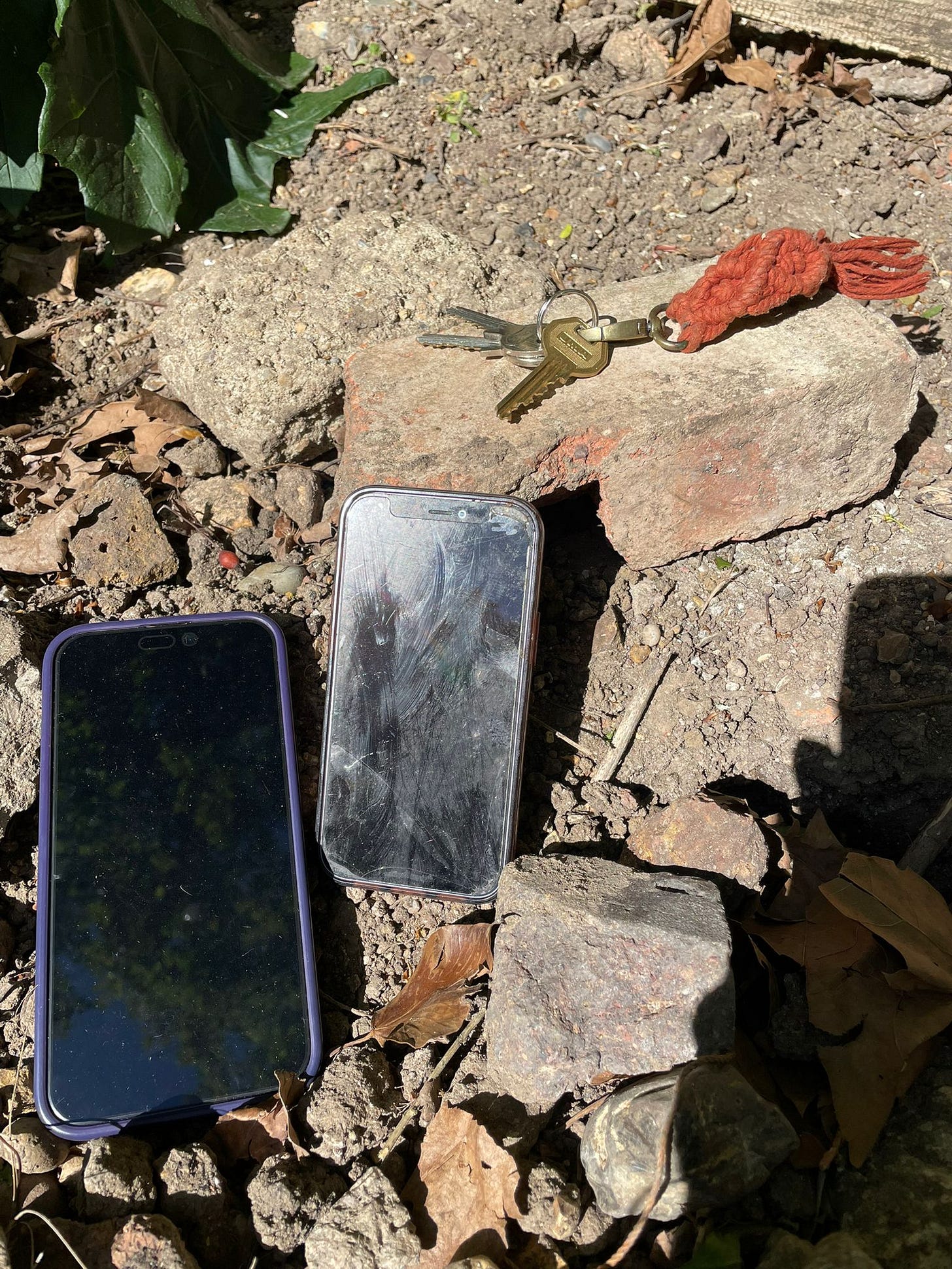
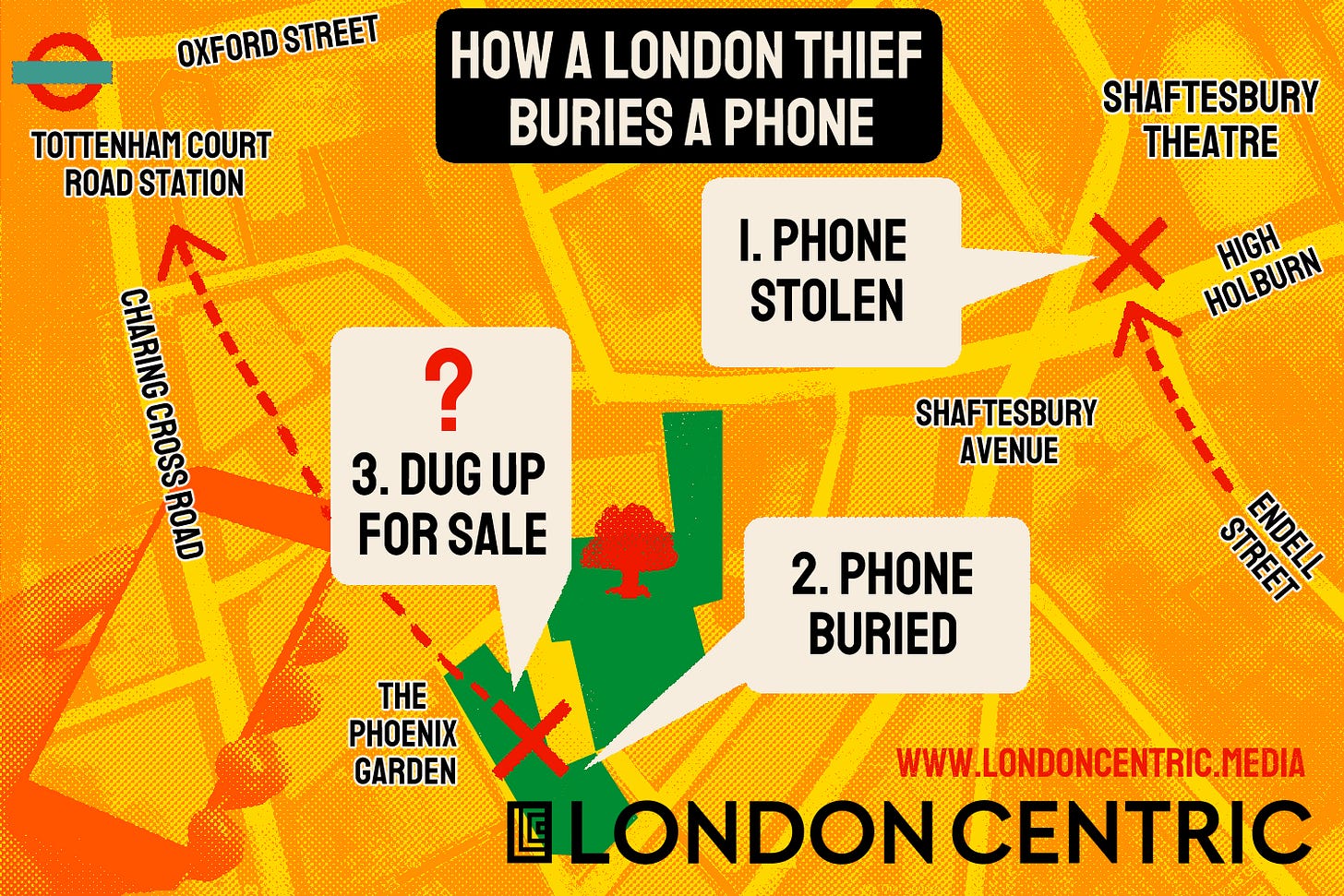

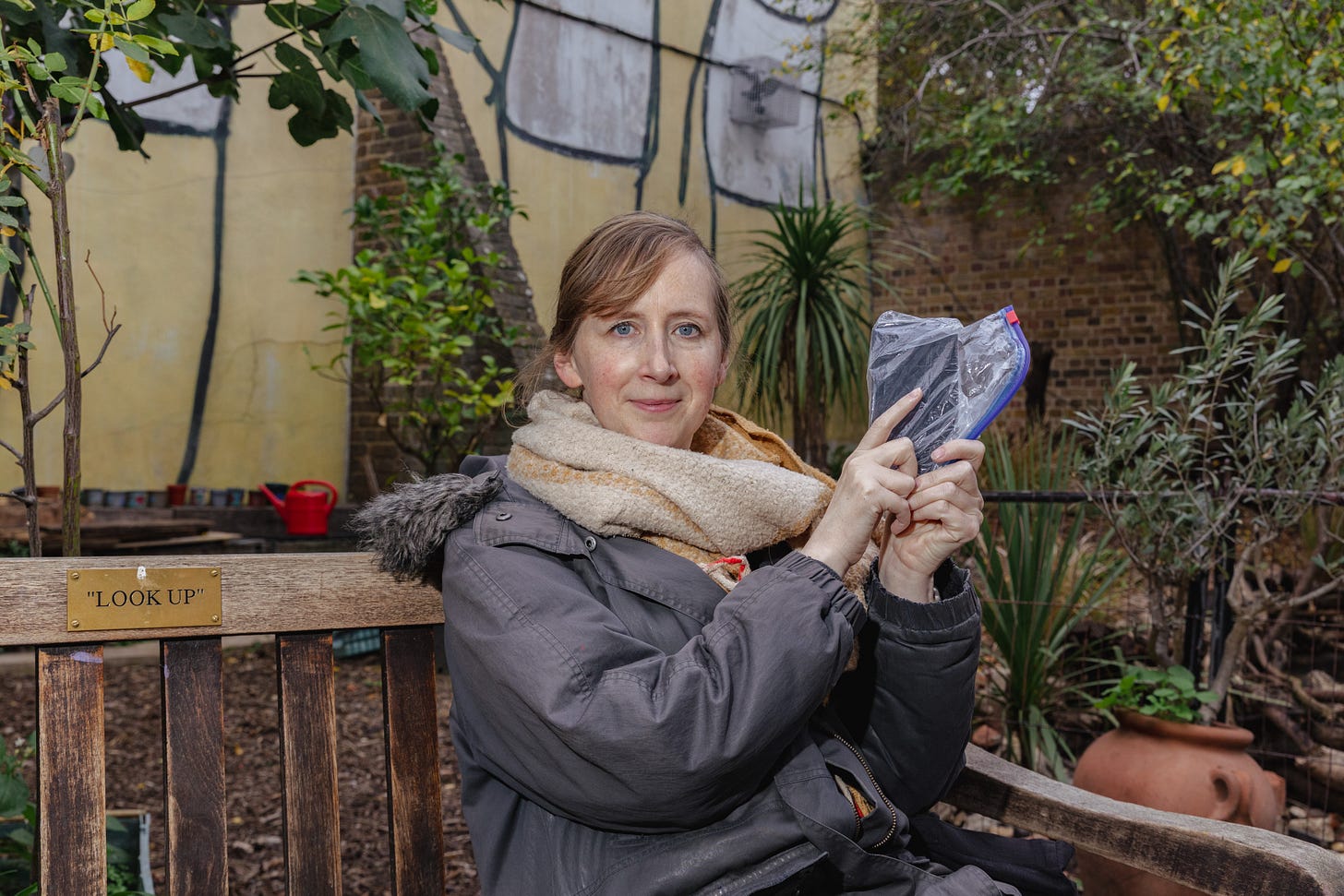
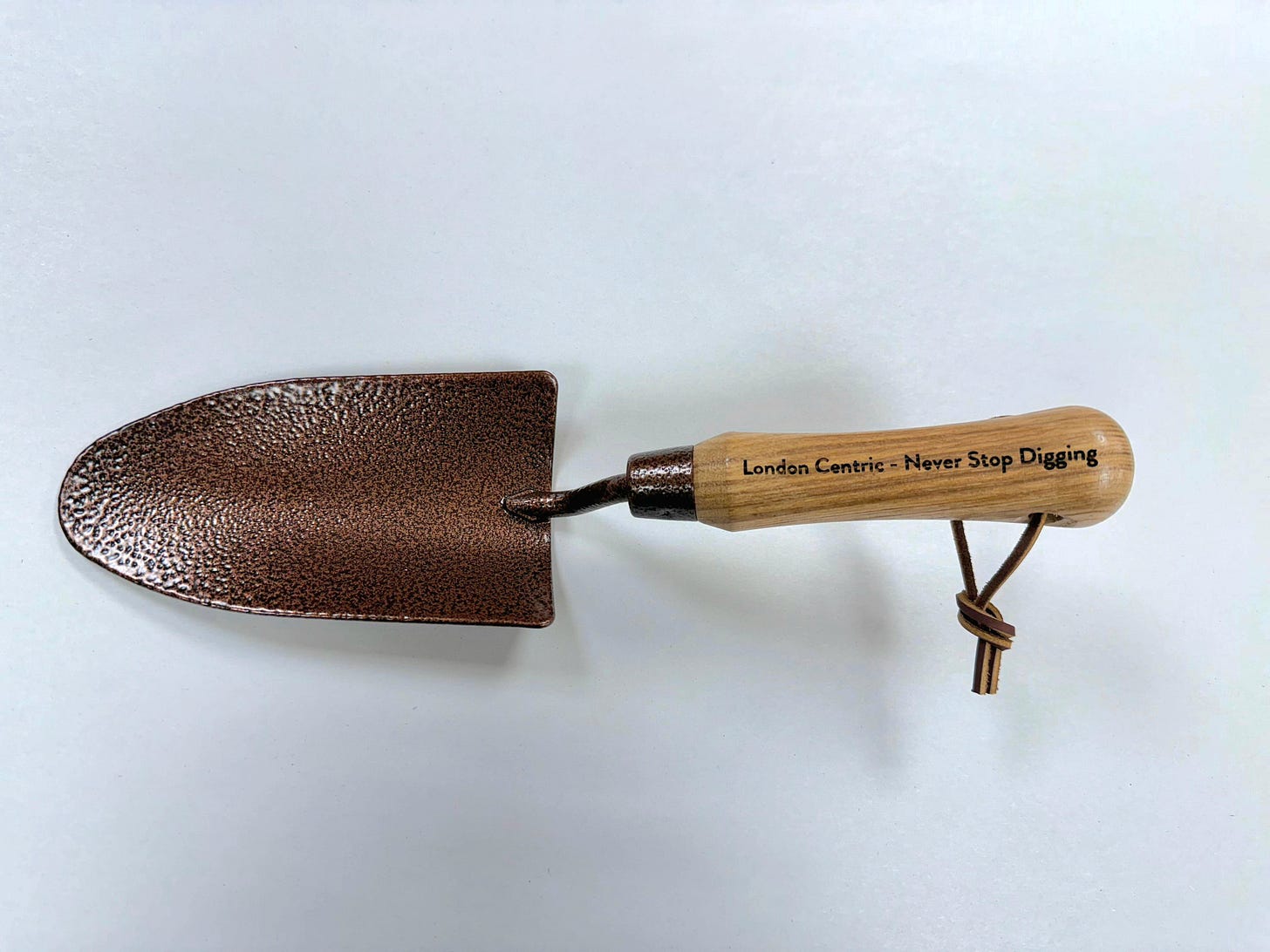
I found a carrier bag of phones in shrubbery in Wilmington Square gardens, inside the bag they were wrapped in tin foil. I only found them because I heard one ringing. I took them to Islington Police Station. They DID seem interested and took details from me and told me I had done my good deed for the day. After reading your article I rather wish I’d gone through the bag to try to reunite the phones with their owners. There were about 10 of them.
I’ve just bought a subscription and I was the original commenter who mentioned the phones in the park so do I get a trowel? (Please?)